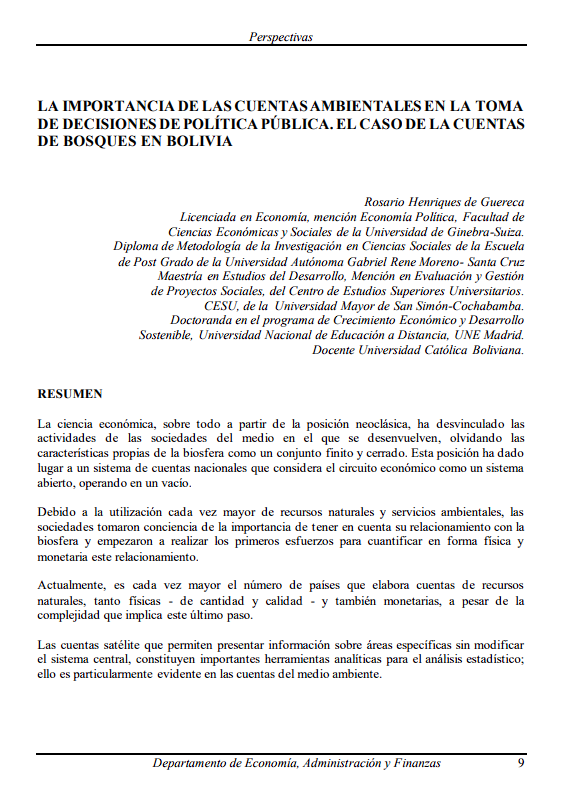The importance of environmental accounts in public policy decision-making. The case of forest accounts in Bolivia
DOI:
https://doi.org/10.35319/h90phz84Keywords:
National accounts, Biosphere, Natural resources, Environmental servicesAbstract
Economics, especially from the neoclassical perspective, has tended to disconnect human activity from the natural environment, overlooking the fact that the biosphere is a closed and finite system. This has led to national accounts that do not adequately reflect the environmental impact of economic activities. As the use of natural resources increases, many countries have begun to develop environmental accounts, both physical and monetary, to quantify their interaction with nature. Satellite accounts allow for the inclusion of specific environmental information without altering the main accounting system. In Bolivia, due to its vast biodiversity and forest wealth, it is essential to advance in this type of accounting, particularly regarding forests. The economic valuation of natural resources should be globally built, taking into account the willingness of biodiverse countries to protect the environment and the willingness of beneficiary countries to compensate them.
Downloads
References
AZQUETA, Diego (2002). Introducción a la Economía Ambiental. Madrid: McGraw-Hill.
CAMPOS, Pablo y José María Casado (2004). Cuentas ambientales y actividad económica. Madrid: Consejo General de Colegios de Economistas de España.
CAMPOS, Pablo y José María Casado (Coord.). Contabilidad nacional ambiental integrada. Grupo de trabajo 26.
CAMPOS, Pablo (2002). Rentas ambientales de la agricultura. Madrid: Ponencia en Jornada Temática “Aspectos Medioambientales de la Agricultura”.
CEPAL (2005). Cuentas Ambientales: conceptos, metodologías y avances en los países de América Latina y el Caribe. Santiago de Chile: Comisión Económica para América Latina y el Caribe.
CEPAL (2003). Cuentas ambientales en los países de América Latina y el Caribe: Estado de situación. Santiago de Chile: Comisión Económica para América Latina y el Caribe.
CEPAL (2001). El concepto de cuenta satélite y la generación de normas y orientaciones por los organismos internacionales. Santiago de Chile: Comisión Económica para América Latina y el Caribe.
DALY, Herman (1993). Sustainable Growth: An Impossibility Theorem. En H. Daly y K. Townsend (Eds.), Valuing the Earth. Cambridge (Mass.): MIT Press.
DALY, Herman (1980). La economía en estado estacionario: hacia una economía política del equilibrio biofísico y el crecimiento moral. En H. Daly (Comp.), Economía, ecología, ética. Ensayos hacia una economía en estado estacionario. México: Fondo de Cultura Económica.
DALY, Herman y Gayo, Daniel (1995). Significado, conceptualización y procedimientos operativos del Desarrollo Sustentable: posibilidades de aplicación a la agricultura. En A. Cadenas (Ed.), La Agricultura y el Desarrollo Sostenible. Madrid: Colección Estudios del MAPA, Serie Estudios N°97.
DEL RÍO, Pablo (1998). Una nota analítica acerca de la relación entre desarrollo sostenible, crecimiento económico y sustentabilidad ambiental. Facultad de Ciencias Jurídicas y Sociales de Toledo: Universidad de Castilla-La Mancha.
FÜRST, Edgar (2003). El debate actual sobre indicadores de sostenibilidad. Costa Rica: Centro Internacional en Política Económica, Universidad Nacional Heredia.
INE (2005). Plan Estratégico Institucional 2005-2009. La Paz: Instituto Nacional de Estadística.
INE (2003). Estadísticas e indicadores ambientales de Bolivia. La Paz: Instituto Nacional de Estadística.
NAREDO, José Manuel (2006). Raíces económicas del problema ambiental. Versión inédita.
NORDHAUS, William y James Tobin (1973). Is growth obsolete?. En The Measurement of Economic and Social Performance, Studies in Income and Wealth, Vol.38, Yale University.
PEARCE, David y Kerry Turner (1995). Economía de los Recursos Naturales y del Medio Ambiente. Madrid: Celeste Ediciones.
PÉREZ, Amelia y Enrique San Martín (2006). Recursos Hídricos y Contabilidad Verde. Madrid: UNED.
REPETTO, R. et al. (1989). Wasting Assets: Nature Resources in the National Income Accounts. World Resources Institute.
UDAPE (2006). Análisis Sectoriales. Sector Forestal 1990-2004. La Paz: Unidad de Análisis de Políticas Sociales y Económicas.
UDAPE (2006). Pobreza y desigualdad en municipios de Bolivia. Segunda edición. La Paz: Unidad de Análisis de Políticas Sociales y Económicas.

Downloads
Published
Issue
Section
License
Copyright (c) 2008 Revista Perspectivas

This work is licensed under a Creative Commons Attribution-NonCommercial-ShareAlike 4.0 International License.
La Revista Perspectivas de la Universidad Católica Boliviana, es una revista de acceso abierto, por lo tanto, es de libre acceso en su integridad. Está permitida su lectura, búsqueda, descarga, distribución y reutilización legal en cualquier tipo de soporte únicamente para fines no comerciales, siempre y cuando la obra sea debidamente citada.




